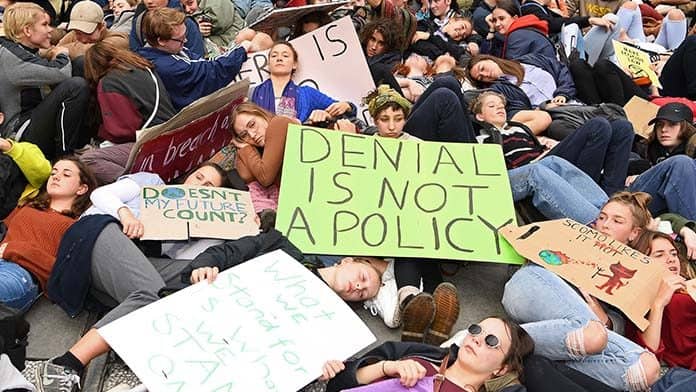Evidence of a rapidly changing climate is mounting. In the Bahamas 70,000 people have lost their homes in one of the strongest hurricanes on record. Australia’s bushfire season has already begun, with authorities saying it is the worst start to the season in Queensland’s history, with over 80 fires burning.
These are exactly the kind of more frequent, more intense disasters that climate scientists have predicted as the planet warms.
Yet Scott Morrison’s government still supports burning fossil fuels. Instead of closing coal power stations, it wants to extend the life of the power plant at Liddell.
Tens of thousands will join the 20 September Climate Strike to demand urgent action. This time high school students will be joined by contingents of unionists. In Sydney, university staff, maritime and construction workers, and workers from warehouses and the community sector will attend in numbers. Victorian Trades Hall is also organising a contingent for the Melbourne rally.
High school student organisers have shifted since the federal election to explicitly reach out to workers. This includes adding a new demand, for funding for a just transition and job creation for fossil fuel workers.
This is a crucial development. Drawing in unions and organised workers is vital to mobilising the social power the movement needs to stop business as usual. We will need strikes on a social-wide basis to win system change.
Action to stop climate change will have to be forced from below—the governments and companies that run the system always put their profits before the planet.
Don’t be fooled by some businesses expressing support for the Climate Strike. Technology company Atlassian and some others have given staff permission to join the rallies. Ice cream company Ben & Jerry’s are promoting the event and closing their stores for the day. They are only doing it because they think that being seen to support the strike will be good for sales.
But thinking that corporations are allies of the movement is a mistake; they are fair weather friends.
Every company will sack workers and cut wages and conditions when they need to boost their profits. Ben & Jerry’s is owned by the multi-national Unilever, which tried to cut Streets ice cream workers’ pay by 46 per cent in 2017 through terminating their enterprise agreement.
No amount of greenwashing can disguise that under capitalism workers and the environment are treated as commodities to be ruthlessly exploited to make profits. It is that system that is killing the planet.
A climate movement that is serious about fighting for system change will need to put the fight for new jobs in renewable energy and increased government spending on public transport at the centre of the social-wide climate transition that is needed. The federal election result showed that demands for climate action which ignore concerns about jobs and workers’ issues allow the Liberals and climate deniers to pose as workers’ friends and pull politics to the right.
We need to demand that coal power stations like Liddell are replaced with 100 per cent publicly-owned renewable energy and that workers in coal communities have guaranteed alternative jobs.
Economy stalling
The crisis that is stalking the Australian and world economies makes the issue of jobs and living standards even more important. There has been widespread alarm after economic growth in Australia over the last year was just 1.4 per cent, the slowest since the 2009 economic crisis. Wages have flat-lined or gone backwards.
Instead of increasing Newstart from its current poverty levels, Morrison is only interested in punishing the unemployed. He has revived the government’s plan for compulsory drug tests for those on welfare, despite the Senate rejecting it twice before the election.
He also wants to expand the demeaning “cashless welfare card”, which forces the unemployed to pay for goods with a special card identifying them as being on welfare. The Australian Council of Social Service opposes the move. Aboriginal communities that have suffered under the policy for years have overwhelmingly rejected it as humiliating.
Morrison is also pushing the anti-union “Ensuring Integrity Bill”, due to be voted on in November. Under the legislation union officials who defy the law could be banned from office. This will boost the power of bosses and the government to harass officials and attack union organisation.
If the union leaders called mass stopwork rallies to oppose the bill, Morrison’s anti-union offensive could be pushed back.
School climate strikers have shown fantastic solidarity with the union movement, publicly condemning the Ensuring Integrity Bill. We need to take the same defiant spirit into the fight against the bosses and Morrison’s anti-union laws.
It is unity between the climate movement and the workers’ movement that has the power to challenge the crisis-ridden system of capitalism and fight for a society that puts people and the planet before profits.






